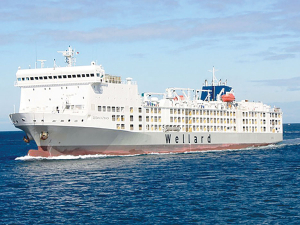Full cabinet
OPINION: Legislation being drafted to bring back the controversial trade of live animal exports by sea is getting stuck in the cogs of Cabinet.
 Under a reinstated live export programme LENZ is pushing for a ‘Gold Standard’ for the export of livestock from New Zealand.
Under a reinstated live export programme LENZ is pushing for a ‘Gold Standard’ for the export of livestock from New Zealand.
Live Export NZ (LENZ), the industry group behind reinstating live exports, says that in 2020 New Zealand exported $255.89 million of live cattle to the rest of the world.
“Live exports have made up roughly 0.2% of all agriculture revenue since 2015. In the past 10 years, around 5000 farmers across New Zealand have supplied breeding cattle for export, with an average of over 40 animals per farm.”
LENZ claims that additional to the livestock value farmers receive directly, a shipment of around 3000 animals can return roughly $1.5 million to New Zealand based service providers – including domestic livestock transporters, veterinarians, feed supply companies, quarantine facilities and regional accommodation providers.
“It’s the rural areas and rural service centres that see most of the economic benefits from the trade as this additional income circulates creating an economic multiplier effect.”
It adds that livestock for export usually attract a premium.
“This can be 50-85% of an animal’s value above the domestic market. Selling livestock for export is a useful income generator for rural communities.”
Under a reinstate live export programme LENZ is pushing for a ‘Gold Standard’ for the export of livestock from New Zealand.
“The Gold Standard system takes export welfare to a level unmatched internationally and contributes to New Zealand’s position as a premium producer of sustainable and ethically produced agriculture.”
LENZ adds that shipping under the Gold Standard will mean:
Legal controls on the movement of fruits and vegetables are now in place in Auckland’s Mt Roskill suburb, says Biosecurity New Zealand Commissioner North Mike Inglis.
Arable growers worried that some weeds in their crops may have developed herbicide resistance can now get the suspected plants tested for free.
Fruit growers and exporters are worried following the discovery of a male Queensland fruit fly in Auckland this week.
Dairy prices have jumped in the overnight Global Dairy Trade (GDT) auction, breaking a five-month negative streak.
Alliance Group chief executive Willie Wiese is leaving the company after three years in the role.
A booklet produced in 2025 by the Rotoiti 15 trust, Department of Conservation and Scion – now part of the Bioeconomy Science Institute – aims to help people identify insect pests and diseases.